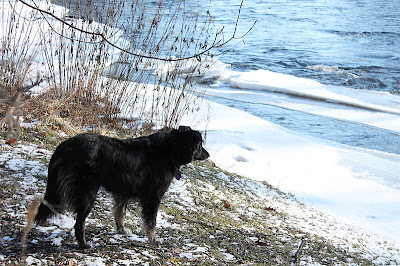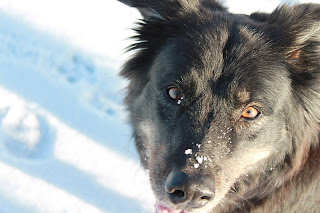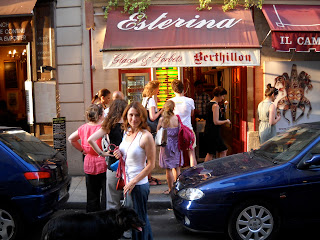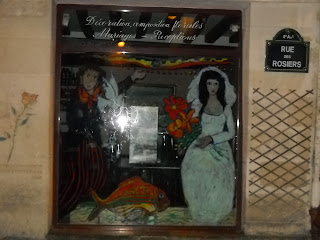My husband is a woodworker, and a few years ago he tried his hand at grandfather clocks. He made two, and they were both beautiful and intricate, but he considers the first one to have been a rough draft. The second one presides over our dinner table, but only as a piece of sculpture, not functional art. For a few seconds once, the arms moved, but he was never able to make them move again--not reliably anyway. And for some reason the date he took this picture is frozen on it, for all time: 7/19/09. And the clock will be forever stuck at 9. July 19 was his birthday. I don't remember what we did that day, but I am glad he got to spend part of the day making art.
We search for a way to fit all the things we want to do into our days, despite the restrictions of time. What we want, I think, is a life that feels rich and full without being rushed, when the ephemeral and the eternal coexist and make for memories we will want to keep. To live fully without rushing, without stress: that's my eternal quest.
And yet, the two most productive people I know are also the busiest.
One of them teaches full time, chairs her department, and is also pursuing another graduate degree, while meanwhile editing a book series and writing books and articles of her own.
She wakes up at 4 AM to write, goes for a run at 6:30 or 7 AM (she is currently training for a half-marathon, although she could run the race tomorrow as she is already "trained") and then works for the rest of the day on all the other stuff she has to do professionally.
She does this all with a great sense of humor and grace. She is compassionate and warm, and makes time for all her friends.
Another friend has managed to work full time in a demanding career in New York City as an editor for magazines that you know and have read. She has two children. She also has manuscripts to edit outside of the workplace. She has a devoted coterie of friends, a large literary circle, a close-knit immediate family, and she never forgets a birthday or a school event.
A lot of busy people write early in the morning, but that was out for her because of family's schedule and her own body rhythms. When the kids were small, she would get home after work at about 5:30, take them to the park if it wasn't dark, and make dinner. Then she and her husband devoted the evening to the two boys. I think, when the boys were very young, she was able to get in an hour of alone-time with her husband after they got the boys to bed. Finally, if all went well, she could spend an hour writing, maybe three or four nights a week, from 9-10 PM. She spent weekends with her family, taking the boys to art lessons and science enrichment and music and more, and only rarely could she put in an hour or two of writing.
Still, she has managed to publish a novel and two short story collections. An essay collection will be out soon, and she is working on another novel.
I have a friend who worked for years and years at a company that packs up art and ships it anywhere in the world. He had to leave at 5 AM to catch the ferry to Seattle, from the island where he lives with his wife, and he would arrive home 14 hours later. He had to work a lot of overtime. And for years, in his spare time, he and his wife worked on their house and their studios and gardens.
Sometimes he would have to spend over an hour in his car waiting to get on the ferry. So that was when he made art. He would open up his notebooks and draw, or make collages, if I recall. He had to have something portable he could take with him, that required no prep time, that he could put aside if the traffic started moving. When the economy imploded, he lost his job, and last I heard, he is making art full-time while he and his wife live on just her salary. If he had not kept a hand in all these years, making art when he could in his car, he would not know how to handle the bizarre scenario of being suddenly set free.
The woman who edited my memoir is also a writer. She has published a novel and a collection of stories, and has edited two story collections, on top of editing a book series, raising a family, and now, being an editor at a prestigious literary magazine. She chipped away at her books by working at lunchtime, at her desk in the office, for years and years. From 12-1--that was it.
I think the key is to figure out where and when you can steal just a little bit of time and use it. And to do it every day, if you can. Even if it's just for a few minutes, when you're sitting in the car, waiting for the traffic to move.
But I don't have the self-discipline of all the people I've described above. If I am exhausted, I can't make myself do anything. So I'm still trying to figure things out.
This week, I'm testing out a new writing schedule. Today is day 2 and I think I might be onto something good here. The story continues tomorrow.
We search for a way to fit all the things we want to do into our days, despite the restrictions of time. What we want, I think, is a life that feels rich and full without being rushed, when the ephemeral and the eternal coexist and make for memories we will want to keep. To live fully without rushing, without stress: that's my eternal quest.
And yet, the two most productive people I know are also the busiest.
One of them teaches full time, chairs her department, and is also pursuing another graduate degree, while meanwhile editing a book series and writing books and articles of her own.
She wakes up at 4 AM to write, goes for a run at 6:30 or 7 AM (she is currently training for a half-marathon, although she could run the race tomorrow as she is already "trained") and then works for the rest of the day on all the other stuff she has to do professionally.
She does this all with a great sense of humor and grace. She is compassionate and warm, and makes time for all her friends.
Another friend has managed to work full time in a demanding career in New York City as an editor for magazines that you know and have read. She has two children. She also has manuscripts to edit outside of the workplace. She has a devoted coterie of friends, a large literary circle, a close-knit immediate family, and she never forgets a birthday or a school event.
A lot of busy people write early in the morning, but that was out for her because of family's schedule and her own body rhythms. When the kids were small, she would get home after work at about 5:30, take them to the park if it wasn't dark, and make dinner. Then she and her husband devoted the evening to the two boys. I think, when the boys were very young, she was able to get in an hour of alone-time with her husband after they got the boys to bed. Finally, if all went well, she could spend an hour writing, maybe three or four nights a week, from 9-10 PM. She spent weekends with her family, taking the boys to art lessons and science enrichment and music and more, and only rarely could she put in an hour or two of writing.
Still, she has managed to publish a novel and two short story collections. An essay collection will be out soon, and she is working on another novel.
I have a friend who worked for years and years at a company that packs up art and ships it anywhere in the world. He had to leave at 5 AM to catch the ferry to Seattle, from the island where he lives with his wife, and he would arrive home 14 hours later. He had to work a lot of overtime. And for years, in his spare time, he and his wife worked on their house and their studios and gardens.
Sometimes he would have to spend over an hour in his car waiting to get on the ferry. So that was when he made art. He would open up his notebooks and draw, or make collages, if I recall. He had to have something portable he could take with him, that required no prep time, that he could put aside if the traffic started moving. When the economy imploded, he lost his job, and last I heard, he is making art full-time while he and his wife live on just her salary. If he had not kept a hand in all these years, making art when he could in his car, he would not know how to handle the bizarre scenario of being suddenly set free.
The woman who edited my memoir is also a writer. She has published a novel and a collection of stories, and has edited two story collections, on top of editing a book series, raising a family, and now, being an editor at a prestigious literary magazine. She chipped away at her books by working at lunchtime, at her desk in the office, for years and years. From 12-1--that was it.
I think the key is to figure out where and when you can steal just a little bit of time and use it. And to do it every day, if you can. Even if it's just for a few minutes, when you're sitting in the car, waiting for the traffic to move.
But I don't have the self-discipline of all the people I've described above. If I am exhausted, I can't make myself do anything. So I'm still trying to figure things out.
This week, I'm testing out a new writing schedule. Today is day 2 and I think I might be onto something good here. The story continues tomorrow.
























































